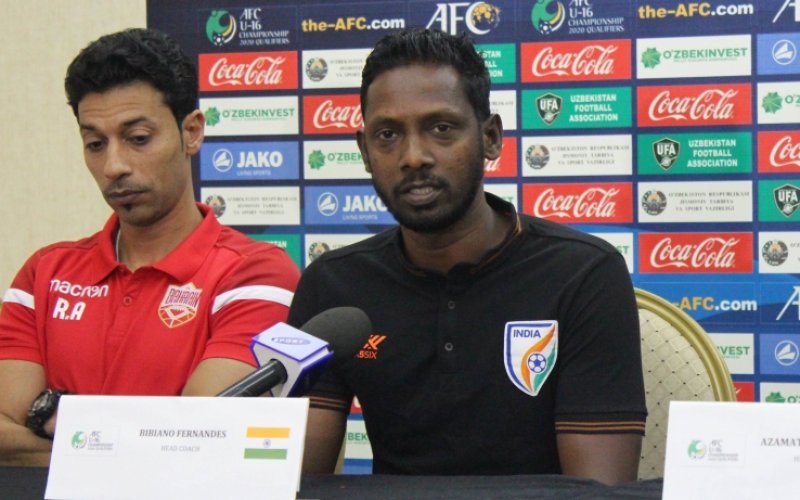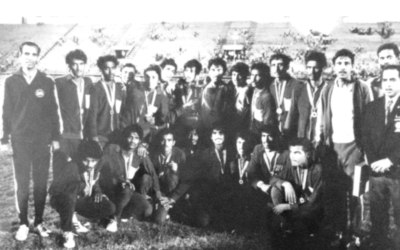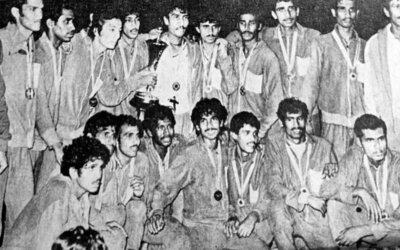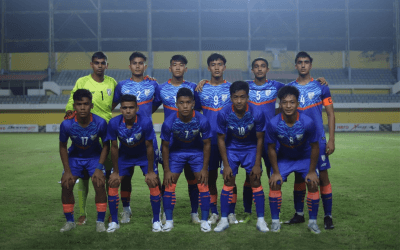By Soumo Ghosh,
AIFF Media Team
TASHKENT: Amidst the melee of young players stood a lanky figure in the very epicentre of everyone’s attention. “The number of goals you have scored against a team does not matter. Every match day is a new day. You must respect your opponents at all times,” comments India U-16 Head Coach Bibiano Fernandes.
The India U-16 Boys have a plan chalked out in front of them, and know exactly what to do in their opening 2020 AFC U-16 Championship Qualifier against Turkmenistan, believes head coach Bibiano Fernandes. India have been pitted in Group B of the Qualifiers, alongside Turkmenistan (vs September 18), Bahrain (vs September 20), and hosts Uzbekistan (vs September 22).
“This is one of the tougher groups in the AFC Qualifiers, and we have been working hard for this competition. We know getting the desired results will not be easy in any of the matches, but we believe that if we play to our ability we will overcome this group,” said Fernandes.
In their first match, the Blue Colts will face off against Turkmenistan, a challenge that Bibiano believes his boys are ready for.
“Turkmenistan will be a tough opponent in the opening game. Of course, we have been preparing for these matches for quite some time, so the boys know exactly what to do. We have our plans, and hopefully, proper execution of these plans will lead to three points tomorrow,” he said.
‘TEACH THEM TO BEHAVE FROM EARKLY STAGE’
The man has built up a reputation for bringing talented youngsters through the rank, providing for a bright future for the senior national team in the years to come. “When you find a talented player, you want to do all you can in order to not lose him. That is why it is very important to teach them how to behave from this early stage.”
Back on the training ground, Fernandes continues to tell his players: “To play good, you must always be good to others, and do good. You may showboat against weaker opposition, but when you play against a stronger team, they will rip you apart.”
“Yes, you all want to make a name for yourselves and score goals. But do not be selfish,” continued Fernandes. “Look at Messi. He has so many assists. Whenever he sees Suarez or Dembele in space he gives it to them. And in life, you get back three times what you give. And thus, he scores so many goals.”
For the gaffer, it is not much different from teaching life, and football lessons to a bunch of kids at school. “They are adolescents. They can get carried away with different things. Hence, it is best to teach them how to behave on and off the pitch from now itself. These are things that the kids would have been learning in school anyway,” says Fernandes.
SHIELDING HIS PLAYERS FROM AN OLD ‘MISTAKE’
Having played in some of the top Indian clubs like Churchill Brothers, Dempo SC, in his early days, Bibiano Fernandes found it difficult to break into the first team, which is why he agreed upon a move to Vasco SC, where he switched to the right wingback position.
“I just wanted to play more football at that point,” laughs Fernandes. “It didn’t matter that I was a striker. I already had good ball control, I had a good physique and stamina, so I took up the challenge of playing fullback.”
The newly-converted fullback soon went on to make a name for himself, and made the move to Sporting Clube de Goa, before being called up to the Indian Senior National Team Camp by former Head Coach Bob Houghton.
“The main difference is that your club knows you, they know your weakness and they know your strengths. So even if you are not on the top of your game at training one day, you will still get the opportunities,” said Fernandes.
“But you need to bring your A-game every time you put on the Indian jersey. Sadly, I did not realise this at that time, and went about my business the same way as I would, at my club,” he said. “I do not want these kids to repeat the same mistake that I made back in my playing days.”
Fernandes’ time in the National Team may have been a brief one, but he had shared the dressing room with some of the absolute legends of Indian football like Bhaichung Bhutia, Renedy Singh, Venkatesh Shanmugam, and Sunil Chhetri.
“I’ve trained with all these guys. The dedication with which they played their football whenever they were called up for the National Team was amazing. They are role models that all young footballers must follow.”
A COACH WHO LEARNT IT THE HARD WAY
The India U-16 Head Coach is someone who may have learnt his trade the hard way, but has shown the capability to learn fast. Having played as both a striker and a fullback, Bibiano went on to play as a central midfielder in the latter parts of his career, when he played for clubs like Sporting Clube de Goa, East Bengal and Santa Cruz Cavelossim Club.
In fact, it was in Santa Cruz that he was first offered a player-coach role in his last season as a professional footballer, and Bibiano immediately took up the challenge. However, he soon found out that orchestrating a midfield, and a tactical assessment of his side were entirely two different cups of tea.
Whenever he was on the pitch, he would leave things up to his trusted assistant Kanan Priolkar, who is now also his assistant at the U-16 National Team. “That first season, I did not have much idea about how to manage a football team,” he admits.
That is why he decided to start from the very bottom -- the next season, joining as the Head Coach of the Sesa Football Academy U-14 side in 2012-13. Once Bibiano had completed his coaching licenses, it was former AIFF Technical Director Scott O’Donnell who recognised his talent, and brought him into the coaching staff of the India U-17 World Cup B team.
It was in this team that Fernandes had trained some of the players who went on to make a name for themselves in the FIFA U-17 World Cup in 2017. Once the U-17 squad was finalised, the young coach was soon given the charge of the then U-15 side, which he needed to prepare for the AFC U-16 Championship (2018), where India lost to Korea Republic in the quarterfinals, a match away from securing a direct qualification to the FIFA U-17 World Cup.
“The reason why we were able to get such good results in the AFC U-16 Championships last year was that we were able to cultivate leadership quality in the players at a very young age,” Fernandes recalls.
“Even when things weren’t going in our favour and the chips were down, there were a number of players in that team, who would rise to the occasion and take responsibility for the others. You need players like these in your team, and we had plenty.”
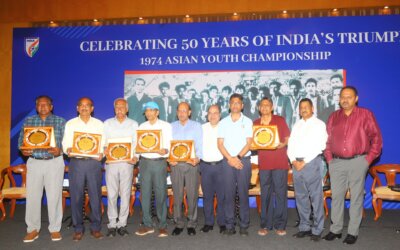

 Shop
Shop



